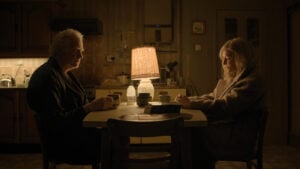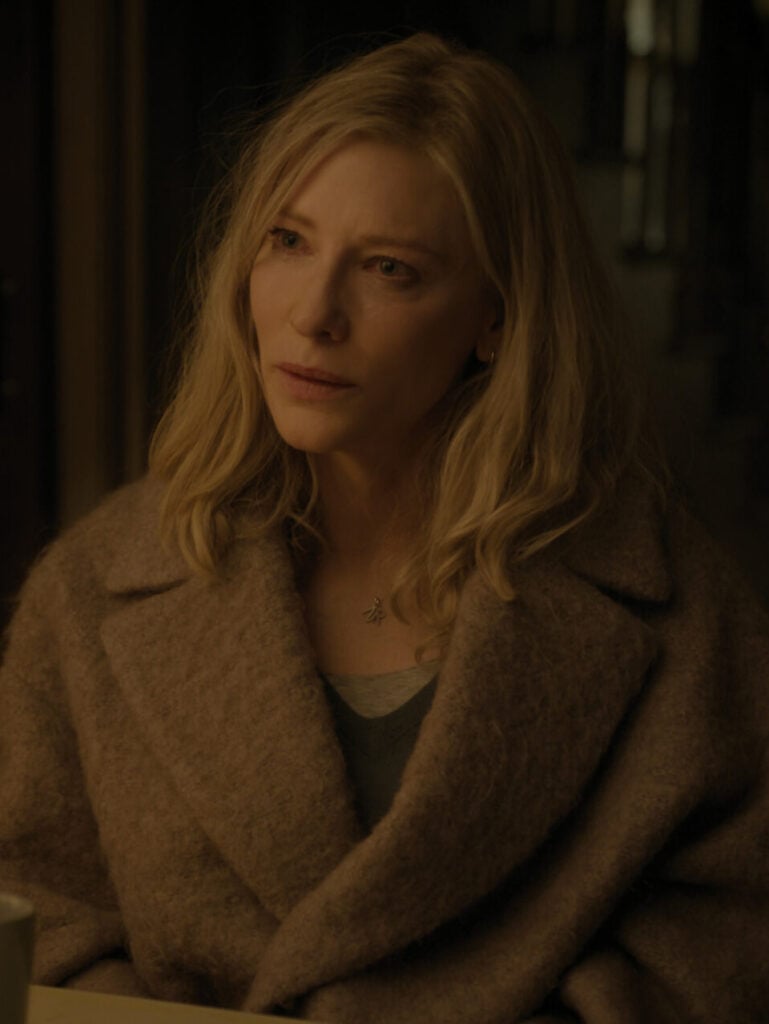Disclaimer’s Finale Delivers Damning Indictment & Vindication with Predictable Twist


Catherine gets vindication as she finally gets to speak.
With Disclaimer Season 1 Episode 7, the limited series concludes with the awaited truth of what happened.
It’s nothing most of us probably didn’t expect this entire time, but if this revelation shocked you, I’m thrilled the series was a ride.


Jonathan was nothing short of a monster, and we spent the entirety of this season watching a trauma survivor get retraumatized again and put through the wringer because a stupid fictional novel and a mother’s desire to coddle her evil ass son because moms and their sons, am I right?
The foot soldiers to misogyny and violence against women are often women themselves.
It’s a lesson we learn repeatedly, yet it never really clicks.
The relationship between mothers and sons and the desire to protect them versus the guilt when one doesn’t carry through most of the series, right to the bittersweet end and closing minute that had Catherine snuggling her boy.
The entire situation failed Catherine, who at least garnered sympathy from those who may not have had any for her initially.
And the series itself didn’t live up to the hype.
It all came together in the end, but my gripe — and it remains this way — is that we shouldn’t have had to slog through seven hours of Disclaimer’s pretty scenery, conflicting performances, and pretentious narration to finally get to the “thrilling” part of the series.
And it underwhelmed me because it’s something one could have seen a mile away from the moment Catherine bumbled through an explanation and got repeatedly shot down by her insecure, loser-ass husband.
On the topic of Robert, there is something so grating about his character specifically that I’ll never quite shake it.
In a sea, pardon the pun, of despicable and loathsome characters, Robert’s actions are so decidedly unforgivable in that way that only the people closest to us, those who love us, can be more harmful than a true enemy.
Because if you cannot even have the benefit of the doubt from the man who promised to love, honor, and respect you, then what the fuck is even life really?
Catherine’s point about how he still sat there sniveling and seemed to express some form of relief that she was raped, VIOLATED, and didn’t betray him was spot on.
He’s a self-loathing, self-absorbed louse with horrendous hair. Sorry, I was getting on a roll.
Robert’s extreme reaction, even in the most dire of times, defied all reason, and every moment he spent ignoring Catherine’s calls and texts and walking out of the room whenever she walked in was more grating than the next.
I say this as someone capable of being a petty princess under certain circumstances.
By the end of the hour, it was satisfying that Catherine followed through with the divorce, but it still never felt like Catherine’s voice was as loud as it should’ve been or that she got to have her say full-throated.
She was still extending a level of grace and restraint that presumably reflected her poshness yet was wholly restricted and measured.
Some of it was likely due to how bone-weary and exhausted she was after this ordeal.
But it’s not even lost on us that she still couldn’t tell her husband her truth — it still had to come from another man, Stephen, the one actively ruining their lives.
Robert’s level of misogyny is the insidious type that’s so deeply rooted in a person they don’t even realize it’s there; worse, they likely convince themselves that they’re enlightened and completely incapable of it, and that’s far more discomfiting than the brash, overt displays sometimes.
It’s infinitely more dangerous because it takes root, grows, spreads like a disease, and slowly wears the person on the receiving end down bit by bit.
Catherine and Stephen’s showdown was long-awaited. Disclaimer does some decent narration work by switching things to first-person, much like Disclaimer Season 1 Episode 6, as she finally gives her account.
We got her story, and when the camera stayed in the present, it largely focused on her, as she was the orator of her own tale, not Stephen or his dead wife.
Then we transitioned to the past again, where Leila George has been doing the Lord’s work and delivering such a compelling performance that it makes most of the slog worthwhile.
In this particular hour, it was a difficult watch as she captured all the raw emotion of a terrified woman who was brutalized and deeply worried about not just her life but that of her son.
As we got Catherine’s side, things clicked into place, like how much she loved spending time alone with young Nicholas.
She learned to appreciate that aspect of her vacation until that fateful evening and subsequent beach death.
It was an absolutely brutal sequence of Jonathan assaulting her, genuinely challenging to watch.
When things switched back to present-day Catherine, and Cate Blanchett captured all the subtle qualities of a trauma survivor, reliving something horrific from the quiver of her voice and faraway glances to stopping mid-sentence to explain her thoughts or some minute detail.
As critical as I have been about this series, I’m not above giving Blanchett and George their absolute due and all their flowers for their respective performances.
George, in particular, is riveting, but I never expect anything less.
Jonathan was a menace to society.
He took an interest in Catherine from the moment he saw her, essentially stalked her, and then pounced the second he got the perfect opportunity.
She never stood a chance when he came into her room, threatening her with a knife as Europeans tend to do and taking a sick, sadistic pleasure in making her succumb to his every whim while using her sleeping son as leverage.
It was truly sick, like an unsub out of Criminal Minds. Jonathan was evidently a sexual sadist and relished in it; hurting women seemed to bring him a neverending pleasure.
Catherine described his actions as “hateful,” which stood out against this series that aimed to explore how deeply misogyny is rooted in society and our everyday lives and how many people perpetuate it with ease.
Jonathan was not the blushing schoolboy who needed some woman to talk him through satisfying a woman, as Nancy implied in those Disclaimer Sex Scenes.
He was a violent young man who took what he wanted, treated his victims like receptacles for his pleasure, and carried on with his day.
It’s enough to make you wonder how many women he’s done this exact same thing to, aside from Catherine and, most likely, Sasha.
Eventually, once the fog of vengeance lifts from pathetic Stephen, we learn that he knew, deep down, this whole time that his son was a monster but didn’t want to believe it.
Imagine if he had simply held his son accountable instead of deluding himself as his late wife did.
We could’ve avoided so much.
But even when facing the truth, he still wasn’t willing to hear it from Catherine, happily sitting there as she collapsed to the floor from her spiked tea.
I’m still livid about it because, not to victim blame, but why the devil would Catherine drink a beverage from the man who tried to kill her son?
I can’t be the only one who hoped that was some form of ruse and that she wasn’t that naive.
Sure, maybe I could find a deeper meaning, like how, as women, we are often conditioned to be polite and accommodating to our own detriment.
Her accepting tea from the literal devil wreaking havoc on her life reflects that.
But I have to reach farther than my 5’2 frame, which allows me to make sense of Catherine’s total lack of self-preservation.
Little things like that detract from the message’s meaningfulness or from what Disclaimer executes well when it does.
Poorly communicated texts, generally senseless and illogical actions, and all these “because plot” moments to push the narrative further are just too inane and contrived to bear.
My heart ached for Catherine as she recounted what happened to her in those flashbacks.
Yet she was as irritating as the others in other ways.
This is Diclaimer’s complicated depiction of its characters.
In the end, I was even relieved that Nicholas survived old man Stephen, even when he, too, was insufferable.
Sadly, the context behind him being the most depressing character of them all is that he witnessed what happened to his mother, but his brain has been protecting him from it all this time.
The funny thing about trauma is the brain can do all this heavy lifting to shelter a person, but the other half can still manifest that trauma in other ways, and the body has a way of remembering, too.
But over to you, Disclaimer Fanatics.
Rate Disclaimer Season 1 Episode 7
I extend heartfelt congratulations to those who made it through this entire series.
If you wanted to skip to the end, I highly advised you to do so.
How did you feel about this ending? Did you predict it? Sound off below.
Watch Disclaimer Online
The post Disclaimer’s Finale Delivers Damning Indictment & Vindication with Predictable Twist appeared first on TV Fanatic.
Source: TV Fanatic
Recent Posts
Ain’t No God Like God of War
From the original game to 2022's Ragnarok, God of War has shown time and again…
Apple’s M4 Mac mini plunges to $499, lowest price ever
Apple's latest M4 Mac mini is back down to Black Friday pricing, with the standard…
Analyst apologises for mistakenly claiming Final Fantasy 16 sold 3.5m copies
An analyst who claimed Final Fantasy 16 had sold 3.5 million copies has apologised, insisting…
‘Free Speech’ Platfrom X Suspends Opposition Party Accounts in Turkey
The bans follow demonstrations protesting the arrest of Erdoğan's main political rival.
‘MagicMiles’ travel itinerary app now lets users add transportation and lodging
I wrote last year about MagicMiles, a new app that helps users create entire travel…
GLENN DANZIG Has No Plans To Record An Album Anytime Soon: “I Really Don’t Have That Much To Say Musically”
"Maybe I'll do like an EP or something." The post GLENN DANZIG Has No Plans…